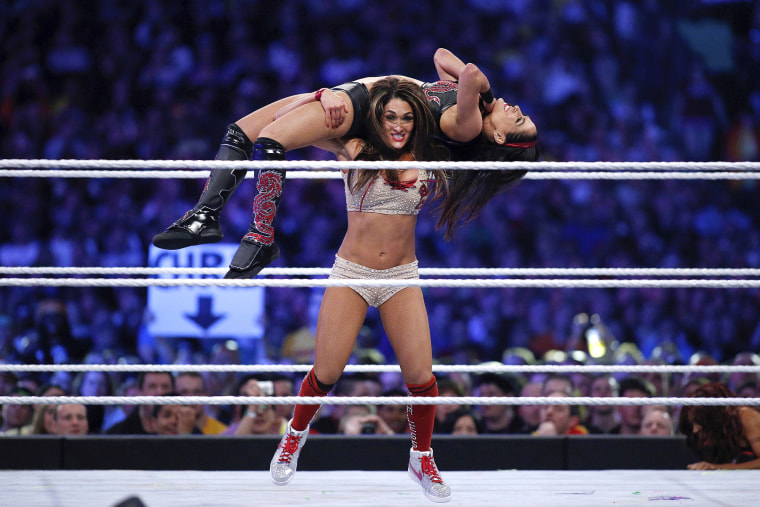April showers bring May flowers — and WrestleMania. This pinnacle of the “sports entertainment” cycle, now in its 35th year, is the WWE’s answer to the NFL’s Super Bowl. The billion-dollar WWE franchise has expanded its reach in the last decade with a successful streaming network and growing fan base. (Even John Oliver is a devotee, and true to form, he kicked off the week-long celebration by calling out the company’s labor practices.) However, like any good soap opera, the show is always looking for a new angle to help sell its five-hour extravaganza, which both serves as an entry point for new fans and a season finale for both “Raw” and “Smackdown” cable shows.
This year, that selling point is women. For the first time since the WWE created the event back in the 1980s, it will be headlined by a women’s championship. Women have appeared as part of the roster since the early years were always relegated to the sidelines. They were the valets who stood by, silent and sexy, next to male wrestlers. In some cases, when the wrestler in question couldn’t deliver a line to save his life, they were the designated mouthpieces as well. Women who actually fought in the ring were treated like intermission points, or filler matches — when they weren’t being forced to wear lingerie or fight with pillows.
The rise of women’s equality movements across the political, entertainment and athletic spectrum have motivated the WWE to change its own attitude towards female wrestlers. Indeed, the company has slowly been building its female brand, holding the first women’s Iron Man match, the first women’s Hell in A Cell match and the first women’s TLC (Tables, Ladders and Chairs) match, all in the last few years. Even so, asking the company’s female A-listers — Charlotte Flair, Ronda Rousey and Becky Lynch — to headline WrestleMania is a dramatic change. And it’s not really about feminism.
In reality, the production is doing this because it has no choice. The current men’s roster simply does not inspire massive outside interest, despite the company’s best efforts. The excitement right now resides in the women’s division, where “The Man” Becky Lynch especially has been a massive draw.
Lynch wasn’t originally supposed to the WWE’s main female star. That honor had been given to Charlotte Flair, daughter of legendary wrestler Ric Flair. Her in-ring persona was a mix of her father’s “dirtiest player in the game” and Cersei Lannister’s scheming. Every pioneering WWE women’s match has starred Flair in some fashion. She is also the face of what the WWE has referred to as the “Women’s Revolution” alongside Ronda Rousey, who came up through the MMA and who is regularly treated as her main challenger.
The rise of women’s equality movements across the political, entertainment and athletic spectrum has motivated the WWE to change its own attitude towards female wrestlers.
Lynch, on the other hand, was supposed to be a bitter if lesser rival. Becky was the antagonist, someone who would be booed simply for walking into the ring. The discomfort male fans felt about her nickname "The Man" was similarly engineered to emphasize this villain role.
But from the outset, that unpopularity never caught on, with Becky’s underdog persona quickly overriding the character she was supposed to be playing. And then, something unscripted happened. During what should have been a routine match to close out a regularly scheduled episode of “Raw,” Lynch was smashed across the face, breaking her nose and her cheekbone. Blood went everywhere. Bleeding on camera is generally a huge WWE no-no, due to FCC standards and practices. Men who bleed only do so accidentally; women never do. The image of Lynch, bloody and victorious, had gone viral by the next morning, including among women who never watched wrestling. And a new fan favorite was born.
The WWE may ultimately still be a sexist company, with vaguely ambivalent feelings about how to proceed in this progressive new world, but it didn’t become such a lucrative business by ignoring opportunity. And to its credit, WWE has embraced Lynch’s ascent, even bringing back the all-but-retired John Cena to give his blessing to the new “Man” in town.
And like any good draw, Lynch is now listed at the top of WrestleMania card along with Flair and Rousey. This means she’s leapfrogged over male stars like Brock Lesner and Roman Reigns and even a highly anticipated match between Triple H and Dave Bautista. Lesner and Reigns have simply not been able to endear themselves to fans, and both HHH and Bautista are at least a decade past their heydays in the early aughts.
WWE’s advertising shop is having a field day promoting this weekend's event as evidence that the company is noble, equality loving and open-minded. But for those who tune in on Sunday, remember that this is a case where equality isn’t just a principled imperative — it’s also capitalism at work.
